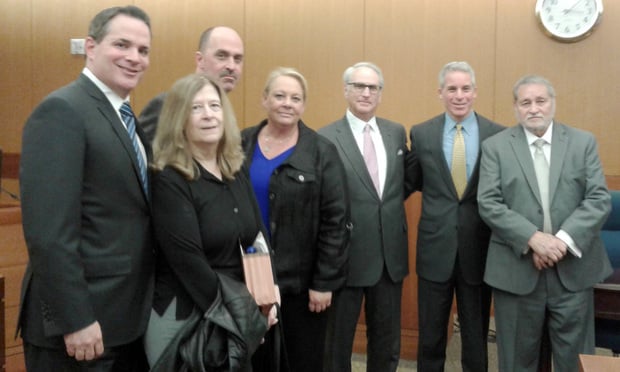After DA Tries to Stop Deliberations, Jurors Acquit All 3 Defendants in Sex Tape Trial
The decision followed a seven-day trial of Rogers' former housekeeper and her former lawyers, Johns Butters and David Cohen.
April 11, 2018 at 03:20 PM
5 minute read

After about seven hours of deliberations, a Fulton County jury returned a defense verdict in the case of a two lawyers and their client accused of illegally recording Waffle House Chairman Joe Rogers Jr. as he engaged in a sex act with the woman.
The decision followed a seven-day trial of Rogers' former housekeeper, Mye Brindle, and her former lawyers, Johns Butters and David Cohen.
The proceedings included often-graphic descriptions of masturbation and other sexual acts Rogers demanded of Brindle and often resembled a trial of Rogers himself as defense lawyers accused the executive of dishonesty, infidelity and abusing employees.
As the defense team swapped congratulations, Cohen's attorney, Brian Steel, said he was delighted, while Butters' attorney, Bruce Morris, said it was the right verdict. Brindle is represented by Reid Thompson.
Cohen blasted Fulton County District Attorney Paul Howard Jr. and Rogers, whom he and his co-defendants are still battling in civil litigation in Cobb County.
“Everyone knows Mr. Howard is carrying around a large bucket of political water,” said Cohen, reading a handwritten statement. “He turned his back on all women who muster the courage and dare to stand up and say 'no'”
“This jury sent a loud message to him and to Mr. Rogers today,” Cohen continued. “I could not be more proud of Ms. Brindle.”
As he dismissed the jury, Superior Court Judge Henry Newkirk noted the dispute will now return to Cobb County, where Rogers' civil litigation against all three is pending.
Rogers agreed saying, “We'll just have to get some feedback from [this] jury.”
The charges stemmed from what prosecution documents and Rogers' lawyers described as a 2012 scheme to use the video, taken by a hidden camera in Rogers' bedroom, to pressure the executive into settling Brindle's sexual harassment claims for millions of dollars.
Fulton County District Attorney Paul Howard Jr. indicted the trio in 2016, three days before the four-year statute of limitations was about to expire. The charges included conspiracy to commit extortion, conspiracy to commit unlawful surveillance and unlawful surveillance.
Fulton County Superior Court Judge Henry Newkirk originally threw out the charges, but the Georgia Supreme Court reinstated the illegal surveillance charges in November.
Key to the case was a Georgia law making it a crime for any person through the use of any device, without consent of all persons observed, to photograph or record the activities of others that occur in a private place out of public view.
The defense argued that Rogers forfeited his right to privacy in his bedroom by summoning Brindle there when he was naked. The video showed the sexual encounter, but it also included casual conversation between Rogers and Brindle that prosecutors said seemed “scripted.”
The defendants were also charged with separate illegal surveillance counts, because the video included a glimpse of Rogers' fully clothed adult daughter as she moved through the kitchen after Brindle left the bedroom with the camera. Defense lawyers argued that was a harmless accident.
Georgia, as a one-party consent state, allows the recording of interactions as long as one of the people knows about it.
Prosecutors pointed to the state Supreme Court's ruling in the case observing that, although Georgia's eavesdropping law only requires one-party consent, its illegal surveillance law bars recording anyone in an area where they have a reasonable expectation of privacy.
The issue came up again during deliberations, when the jurors sent a note asking whether one-person consent is the law and for a copy of the statute.
Prosecutors said Newkirk should send them the law as well the Georgia Supreme Court ruling reinstating the case. That ruling said the one-party consent rule did not eliminate the requirement for “all” persons to give their consent before being recorded in a private place.
Newkirk refused and sent back a copy of the law in question, as requested.
Prosecutors tried and failed to stop jury deliberations after lunch, filing an “Application for Emergency Stay of Deliberations by the District Attorney” claiming Newkirk gave the jury “clearly erroneous instructions” about one-party consent.
“The denial of this emergency motion will be directly appealed to the Georgia Supreme Court,” the motion said.
Newkirk reiterated that he gave the jury what they requested.
“I'm not going to re-charge the jury,” he said.
As she left the courtroom, lead prosecutor Melissa Redmon said the matter of the jury charge was now moot.
“We have a verdict. It's over,” she said.
This content has been archived. It is available through our partners, LexisNexis® and Bloomberg Law.
To view this content, please continue to their sites.
Not a Lexis Subscriber?
Subscribe Now
Not a Bloomberg Law Subscriber?
Subscribe Now
NOT FOR REPRINT
© 2025 ALM Global, LLC, All Rights Reserved. Request academic re-use from www.copyright.com. All other uses, submit a request to [email protected]. For more information visit Asset & Logo Licensing.
You Might Like
View All
Law Firms Expand Scope of Immigration Expertise Amid Blitz of Trump Orders
6 minute read
Bass Berry & Sims Relocates to Nashville Office Designed to Encourage Collaboration, Inclusion
4 minute read
Gunderson Dettmer Opens Atlanta Office With 3 Partners From Morris Manning
3 minute read
Trending Stories
- 1Inherent Diminished Value Damages Unavailable to 3rd-Party Claimants, Court Says
- 2Pa. Defense Firm Sued by Client Over Ex-Eagles Player's $43.5M Med Mal Win
- 3Losses Mount at Morris Manning, but Departing Ex-Chair Stays Bullish About His Old Firm's Future
- 4Zoom Faces Intellectual Property Suit Over AI-Based Augmented Video Conferencing
- 5Judge Grants TRO Blocking Federal Funding Freeze
Who Got The Work
J. Brugh Lower of Gibbons has entered an appearance for industrial equipment supplier Devco Corporation in a pending trademark infringement lawsuit. The suit, accusing the defendant of selling knock-off Graco products, was filed Dec. 18 in New Jersey District Court by Rivkin Radler on behalf of Graco Inc. and Graco Minnesota. The case, assigned to U.S. District Judge Zahid N. Quraishi, is 3:24-cv-11294, Graco Inc. et al v. Devco Corporation.
Who Got The Work
Rebecca Maller-Stein and Kent A. Yalowitz of Arnold & Porter Kaye Scholer have entered their appearances for Hanaco Venture Capital and its executives, Lior Prosor and David Frankel, in a pending securities lawsuit. The action, filed on Dec. 24 in New York Southern District Court by Zell, Aron & Co. on behalf of Goldeneye Advisors, accuses the defendants of negligently and fraudulently managing the plaintiff's $1 million investment. The case, assigned to U.S. District Judge Vernon S. Broderick, is 1:24-cv-09918, Goldeneye Advisors, LLC v. Hanaco Venture Capital, Ltd. et al.
Who Got The Work
Attorneys from A&O Shearman has stepped in as defense counsel for Toronto-Dominion Bank and other defendants in a pending securities class action. The suit, filed Dec. 11 in New York Southern District Court by Bleichmar Fonti & Auld, accuses the defendants of concealing the bank's 'pervasive' deficiencies in regards to its compliance with the Bank Secrecy Act and the quality of its anti-money laundering controls. The case, assigned to U.S. District Judge Arun Subramanian, is 1:24-cv-09445, Gonzalez v. The Toronto-Dominion Bank et al.
Who Got The Work
Crown Castle International, a Pennsylvania company providing shared communications infrastructure, has turned to Luke D. Wolf of Gordon Rees Scully Mansukhani to fend off a pending breach-of-contract lawsuit. The court action, filed Nov. 25 in Michigan Eastern District Court by Hooper Hathaway PC on behalf of The Town Residences LLC, accuses Crown Castle of failing to transfer approximately $30,000 in utility payments from T-Mobile in breach of a roof-top lease and assignment agreement. The case, assigned to U.S. District Judge Susan K. Declercq, is 2:24-cv-13131, The Town Residences LLC v. T-Mobile US, Inc. et al.
Who Got The Work
Wilfred P. Coronato and Daniel M. Schwartz of McCarter & English have stepped in as defense counsel to Electrolux Home Products Inc. in a pending product liability lawsuit. The court action, filed Nov. 26 in New York Eastern District Court by Poulos Lopiccolo PC and Nagel Rice LLP on behalf of David Stern, alleges that the defendant's refrigerators’ drawers and shelving repeatedly break and fall apart within months after purchase. The case, assigned to U.S. District Judge Joan M. Azrack, is 2:24-cv-08204, Stern v. Electrolux Home Products, Inc.
Featured Firms
Law Offices of Gary Martin Hays & Associates, P.C.
(470) 294-1674
Law Offices of Mark E. Salomone
(857) 444-6468
Smith & Hassler
(713) 739-1250






